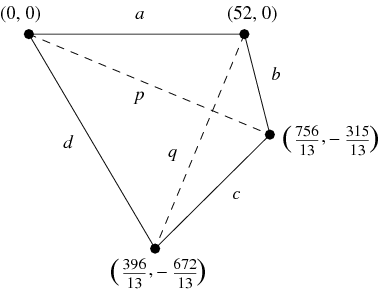"A polygon is said to be rational if all its sides and diagonals are rational, and I. J. Schoenberg has posed the difficult question, ‘Can any given polygon be approximated as closely as we like by a rational polygon?’"
This is a quote from
D.D. Ang, D.E. Daykin, and T.K. Sheng. "On Schoenberg's rational polygon problem." Journal of the Australian Mathematical Society 9.3-4 (1969): 337-344. (journal link.)
I seek to understand the current status of this question. I know (from D.E.Daykin, "Rational polygons," (journal link)) that Mordell showed that the set of all rational quadrilaterals is dense in the set of all quadrilaterals. I am only finding ~40-yr-old papers, none of which are easily accessed online.
(Added:) As Aaron Meyerowitz and Gerry Myerson point out, it is unknown if there even exists a single rational octagon. But I am interested in the dense question. For example, is it already known that the set of all rational pentagons is not dense in the set of all pentagons? If not for pentagons, then for hexagons? Heptagons?

MathWorld image of a rational quadrilateral
